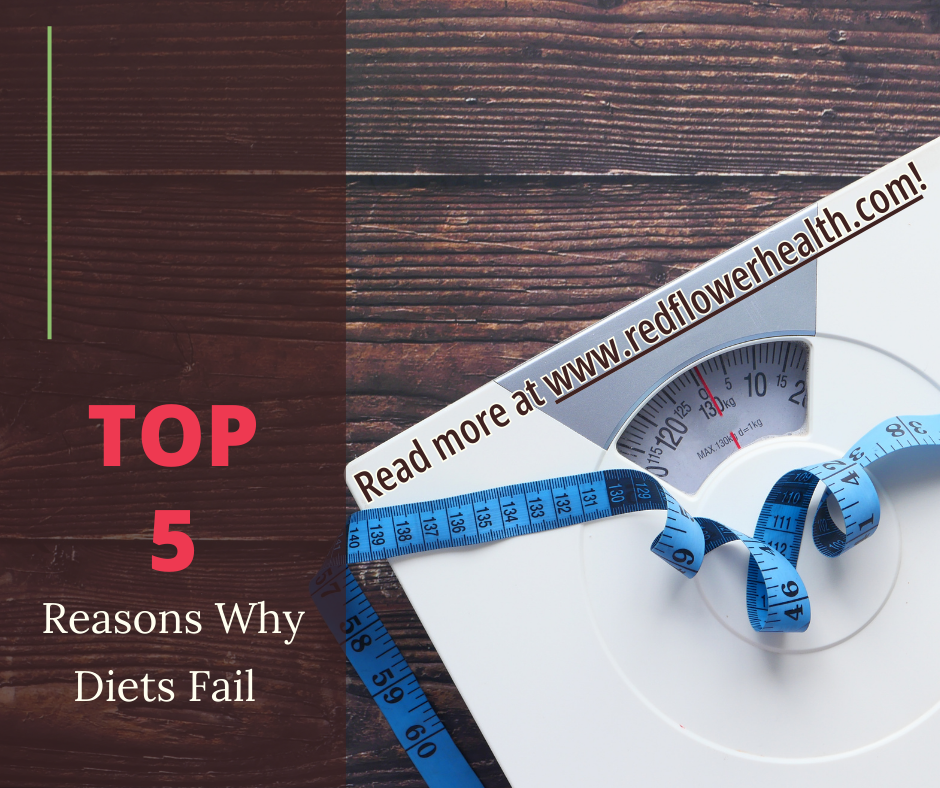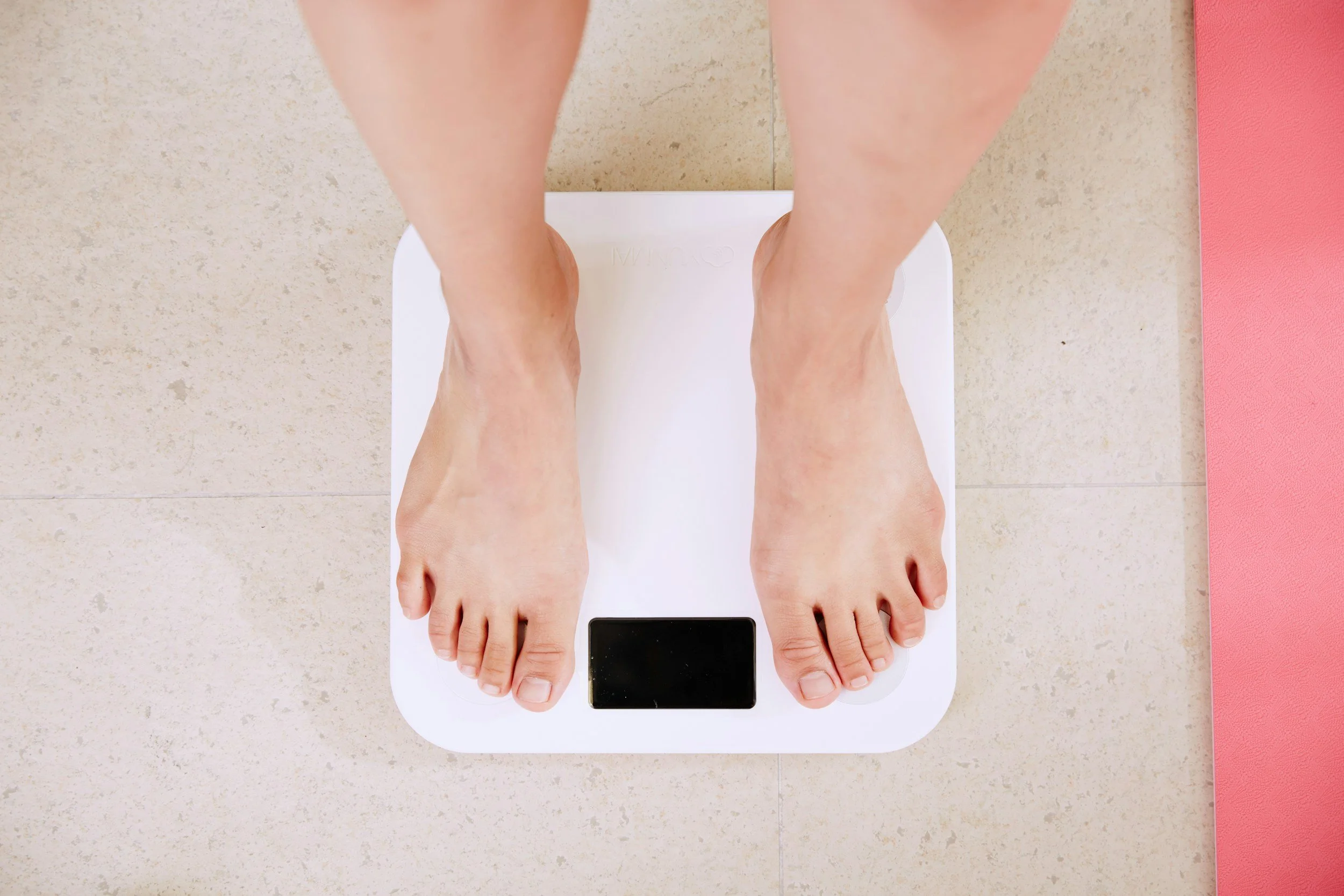Top 5 Reasons Why Diets Fail
“Many diets cut out or encourage you to eliminate entire food groups like fats, carbs, dairy, grains, or meat for example. At best, this may be unrealistic in the long run to sustain given someone’s individual food preferences. At worst, it can lead to nutritional deficiencies and cause unpleasant symptoms like fatigue, dizziness, muscle cramps, and constipation. (Just to name a few!)”
If you’re like most of us, then you’ve probably tried dieting at some point or another. I don’t even want to get into all the dozens of trendy dieting options that are out there these days because (in my humble opinion!) most of them don’t work! YES, I SAID IT! Or at least they may work temporarily but in the long run, studies show that (unfortunately!) most people end up regaining most of the weight they originally lost and some even end up weighing more than they did BEFORE they started dieting [1]!
I know from firsthand experience how painfully true this can be! If you’re interested, you can read more about my personal testimony HERE about how my binge drinking and compulsive overeating led to repetitive weight gain and worsening physical health in my early 20s. I had successfully “dieted” my way back down to a healthy weight but (like most!) I ended up gaining it all back and more within a year or so after I stopped the diet…
So why do diets fail? And is there anything we can do to try to lose weight and KEEP IT OFF for good? Let’s dig deeper!
The Top 5 Reasons Why Diets Fail:
Reason #1: Most Diets Aren’t Sustainable!
I’m sure if you’ve dieted before, then you’ve probably experienced how MOST diets don’t fit well into your daily routine. This (inevitably!) makes them hard to stick to in the long run. Many diets require you to weigh or measure out food, which may help you to lose weight in the short run, but isn’t realistic for most people to keep up with long-term so they give up and go back to eating the way they did before they started the diet [2]. Diets can also have a lot of strict rules to follow and “off-limit” foods that might help you lose weight initially, but in the long run, they can be hard to keep up with so many people stop following them [3].
I know from personal experience that many diets require you to completely change most of the foods you’re accustomed to eating, which can be a HUGE learning curve and really overwhelming to follow. I have also struggled with keeping up with diets in the past because eating is (oftentimes!) a social event spent with others. Diets often make it difficult to eat out or can be hard to stick to when others in your household aren’t on board with the diet you are trying to follow. All of these reasons contribute to most diets not being sustainable and therefore they often fail.
Reason #2: Most Diets Promote Unbalanced Nutrition!
Many diets cut out or encourage you to eliminate entire food groups like fats, carbs, dairy, grains, or meat for example. At best, this may be unrealistic in the long run to sustain given someone’s individual food preferences [2]. At worst, it can lead to nutritional deficiencies and cause unpleasant symptoms like fatigue, dizziness, muscle cramps, and constipation. (Just to name a few!) [4].
In my experience as a health coach and nurse practitioner, I’ve seen many examples of clients and patients developing nutritional deficiencies when they unnecessarily avoid certain food groups or don’t consistently eat foods from each group. Don’t get me wrong! Some people do have to avoid certain foods for medical reasons, but we shouldn’t be eliminating entire food groups unless a healthcare provider has recommended this for us in the past.
Reason #3: Most Diets Are Overly Restrictive!
We have already touched on this a bit in the last two reasons why most diets fail, but I want to dig a little deeper into how being overly restrictive with foods can be harmful to us. When we try to follow diets that have strict rules about which foods are “good” to eat and which foods are “bad” to eat, it can lead to unhealthy relationships with food and increase the risk of developing disordered eating habits. When we restrict foods unnecessarily, it can cause us to crave them even more which then can backfire and cause us to unhealthily binge on those foods when we do break down and eat them [4].
In time, our mental health can be affected and we can get into unhealthy cycles where we feel guilt and shame for indulging in “bad” foods and then afterward strive for perfection in our food choices. This can lead to unnecessary stress and contribute to rapid cycling of our weight up and down which has been shown to have worse outcomes to our health [4]. This is something I’ve personally had experience with and have witnessed many loved ones struggle with as well. There is SO much confusion and food shame in our culture right now! My heart breaks for those who struggle with this.
Reason #4: Most Diets Are Expensive!
Many dieting programs pressure you to buy their products or supplements or encourage you to only buy expensive food products in the name of “health” [2]. These products can be unsustainable in the long run, especially for those on a tight budget. The truth is that most of the companies who promote fad diets are trying to make money so they often make promises about their products or programs that simply aren’t true to make a profit [4]. Over time, you can waste lots of money buying the latest supplements, weight loss books, or “healthy” food products only to turn around and feel pressured to buy the next latest and greatest diet program that is currently being promoted. In reality, you shouldn’t need to buy any special supplements or products to follow a healthy diet [3].
This is something that my husband actually fell victim to not too long ago. He came across some ads promoting a weight loss program on the internet and decided to enroll in the program. In order to enroll, he was required to purchase some of the weight loss supplements they promoted and sign up for a monthly subscription. As a nurse practitioner, I’m not *really* convinced any of the ingredients in the supplements he purchased have much (if any!) evidence to show they help with weight loss. Most of the videos in the program talked in circles, but never truly provided much information about tangible ways to lose weight and some of them even required you to purchase more of their products to “unlock” more videos that supposedly revealed the secrets to losing weight. Thank God he ended up canceling the subscription because it ended up being such a waste of money and he didn’t learn any “magical secrets” to lose weight that we did not already know before he purchased the program. You live and you learn I guess!
Reason #5: Most Diets Don’t Teach Healthy Habits or Emphasize a Long-Term Plan!
Many diets are viewed as something you follow to lose weight and then you come off them once you (hopefully!) meet your weight loss goal. Once you go back to eating like you “normally” do, oftentimes the weight returns [2]. In the short run, you may experience some improvements in your health markers like your blood pressure or blood sugar, but if you don’t work to change your long-term habits, oftentimes those improvements are only temporary [4].
The reality is that oftentimes the quick and “easy” way to lose weight is not usually the sustainable way. What’s the point of hitting your weight loss goal if you end up gaining it all back? This can be SO discouraging and cause people to give up altogether because they believe health is just something that isn’t attainable for them.
But please don’t give up because you are NOT a failure no matter how many diets you’ve tried in the past! You can only fail if you give up completely, and if you’re reading this blog post, my guess is that you haven’t given up yet, so let’s talk about how to overcome past failed diets!
The Solution:
Solution #1: Focus on Changing One Habit at a Time!
Have you ever heard the phrase, “slow and steady wins the race”? Well, that is abundantly true when it comes to improving your health or your weight! Oftentimes we didn’t get to where we are today in our health overnight, so it isn’t realistic to expect to be able to undo all the unhealthy habits we’ve learned over the years quickly either. One of the top reasons people aren’t successful in making changes in their health is because they try to change too much too quickly and (like you’ve read above!) it oftentimes does not result in long-term success [5].
It’s often far better to focus on making one small change at a time, and once it becomes a habit, then move on to make another small change in your diet [5]. Making small changes like choosing water instead of soda today or adding an additional vegetable to your dinners this week are more easily incorporated into your daily routine and feel less restrictive than changing your entire diet. This increases your chances of success [3]. Making changes like this will likely result in slower and steady results but will increase the likelihood of them being long-term and sustainable. In the end, it shouldn’t matter how quickly you get there but rather once you get there you actually STAY there!
Solution #2: Evaluate Your Relationship With Food!
Are you using food in unhealthy ways to cope with stress or other emotional issues? Do you maybe have some disordered eating habits or possibly some food addictions? It’s not uncommon to turn to food to deal with difficult feelings. We all do it sometimes! But if you’re finding it’s your main coping mechanism or that you often eat to cope with emotions even if you’re not physically feeling hungry, it may be time to seek outside help from a mental health professional, registered dietician, or the support of others [6].
Some ways to combat emotional eating include keeping a food journal to see if you can spot patterns between your mood, physical level of hunger, and the types and quantities of food you eat. Try to regularly engage in other activities that help to lower stress or fight boredom like exercise, reading, listening to music, mindfulness, talking with others, or deep breathing exercises [7]. We weren’t created to do life alone so it may be helpful to reach out to friends or family for support or consider joining a support group like Overeaters Anonymous [6]. Avoid keeping foods in your home that you know are your “go-to” comfort foods and wait to do your grocery shopping when you’re in a calm state of mind. If you have cravings or urges, try to satisfy them with healthier alternatives but avoid depriving yourself. It can be helpful to treat yourself occasionally to satisfy your cravings to avoid binges. Lastly, give yourself GRACE and avoid shaming yourself! If you have a setback, try to learn from the experience and make a plan for how to avoid it next time. Take time to be PROUD of the changes you’re making and all the little successes along the way [7]!
Solution #3: Consider Following the Mediterranean Diet! (Or Should I Say Lifestyle?)
This is the lifestyle I personally strive to follow and encourage my patients and clients to follow as well, both in my work as a nurse practitioner and as a health coach! But didn’t you just spend all this time talking about how diets are bad?!? Yes, I did, but hear me out! The Mediterranean diet is more of an eating pattern that emphasizes the types of foods traditionally eaten in the Mediterranean region than a strict dietary plan [8].
Why do you recommend this, you may ask? This part of the world on average has consistently enjoyed lower levels of chronic disease and higher life expectancies compared to the rest of the world and it’s believed that the traditional diet and lifestyle of this area has largely contributed to these health benefits [8]. There is also lots of research that has shown time and time again that the Mediterranean diet helps to prevent heart disease and other chronic illnesses like type 2 diabetes and cancer, increases your chances for longevity, lowers inflammation, promotes a healthy weight, and optimizes your blood sugar [8, 10]. And the people in this region have been eating and living the way they do for CENTURIES so it’s not just another fad diet that’s here today and gone tomorrow [9]!
So what IS the Mediterranean diet? This lifestyle emphasizes eating REAL food like fruits, vegetables, beans, nuts, legumes, seeds, whole grains, fish, seafood, olive oil, herbs, and spices regularly. Foods like dairy products, eggs, poultry, and red wine are enjoyed in moderation and other sources of animal protein and sweets are eaten in smaller amounts. It’s also encouraged to drink water as your main source of hydration, enjoy meals together socially with others as much as possible, and incorporate some level of physical activity each day [8]. I have a food pyramid shown below for visual reference that is based on the Mediterranean diet.
And if I haven’t convinced you yet to consider following the Mediterranean diet then I hope this helps! There are NO off-limit foods or food groups and it’s considered one of the easiest and family-friendly diets to follow long-term because of the diverse amounts of foods and flavors you get to enjoy! You don’t have to count calories or other nutrients (unless you want to!) and most people report feeling full and satisfied while following it because the diet is full of HEALTHY FATS and FIBER which help to curb hunger [10].
Solution #4: Consider Working With a Health Coach!
I know I’ve shared a TON of information in this blog post so far and you may be in information overload! And that’s okay! It takes time to learn a new way of healthy living so give yourself some grace! But change can be hard, and sometimes we can struggle with knowing where to start or how to stay motivated to make healthy changes in our lives. And this is where working with a health coach can be helpful [11]!
Research shows that health coaching is a cost-effective and efficient method that helps people to be more successful in achieving their weight loss goals and stay more motivated than just participating in health education alone [11]. Some studies have shown that health coaching can help people improve their blood pressure, cholesterol, blood sugar, and quality of life compared to attempting to make improvements in these areas by themselves [12].
If you’re interested in seeing if health coaching may be a good fit for you in accomplishing your healthy living goals, then I encourage you to learn more about my 12-week one-on-one health coaching program HERE. Alternatively, if you’d rather talk things out, then I encourage you to schedule a FREE 30-minute no-obligation connection call with me HERE. I’d love to hear from YOU and see how I can help you be successful in reaching your weight loss goals or other goals you may have for your health!
So to recap, today we discussed the top 5 reasons why most diets fail. We reviewed how most diets are UNSUSTAINABLE, promote UNBALANCED nutrition, are overly RESTRICTIVE, can be EXPENSIVE, and DON’T focus on creating healthy habits or a long-term plan.
Some of the solutions I proposed to overcome some of these (almost inevitable!) diet failures are to focus on changing ONE habit at a time, evaluating your RELATIONSHIP with food, following the MEDITERRANEAN diet, and working with a HEALTH COACH! I shared lots of helpful tips from my personal journey, my experience working with patients and clients as a health coach and nurse practitioner, and what the latest research has to say on the subject matter.
And as always, I’m here for you no matter what!
Praying for discernment and clarity for you in your health journey,
Coach Tiffany
Subscribe
Sign up with your email address to receive news, updates, and access to my Totally Free Grocery Shopping Guide!
Footnotes
[1] “Do 'Diets' Really Just Make You Fatter?” Healthline, 24 May 2024, https://www.healthline.com/nutrition/do-diets-make-you-gain-weight.
[2] “Why Diets Fail.” Michigan Department of Health & Human Services, 28 May 2024, https://www.michigan.gov/healthymichigan/people/weight/diet.
[3] “Fad Diets: Are They Sustainable?” Oregon Health & Science University, 30 May 2024, https://www.ohsu.edu/womens-health/fad-diets-are-they-sustainable.
[4] “Why Fad Diets Don’t Work, Plus 7 Tips for Sustainable, Healthy Eating.” Healthline, 30 May 2024, https://www.healthline.com/health/why-fad-diets-dont-work.
[5] “Making lifestyle changes that last.” American Psychological Association, 30 May 2024, https://www.apa.org/topics/behavioral-health/healthy-lifestyle-changes.
[6] “Emotional Eating: What You Should Know.” Healthline, 30 May 2024, https://www.healthline.com/health/emotional-eating.
[7] “Weight loss: Gain control of emotional eating.” Mayo Clinic, 30 May 2024, https://www.mayoclinic.org/healthy-lifestyle/weight-loss/in-depth/weight-loss/art-20047342.
[8] “Diet Review: Mediterranean Diet.” Harvard T.H. Chan School of Public Health, 30 May 2024, https://nutritionsource.hsph.harvard.edu/healthy-weight/diet-reviews/mediterranean-diet/.
[9] Blanco, Bess. FRESH Start for Health. E-book, Bess Blanco Media, 2013.
[10] “Mediterranean Diet: Beginner’s Guide to a Healthy Heart.” U.S. News & World Report, 30 May 2024, https://health.usnews.com/best-diet/mediterranean-diet.
[11] Muñoz Obino, Karen Fernanda, et al. “Coaching and barriers to weight loss: An integrative review.” Diabetes, Metabolic Syndrome and Obesity, vol. 10, 2017, pp. 1-11.
[12] “Health coaching is effective. Should you try it?” Harvard Health Publishing, 30 May 2024, https://www.health.harvard.edu/blog/health-coaching-is-effective-should-you-try-it-2020040819444.














